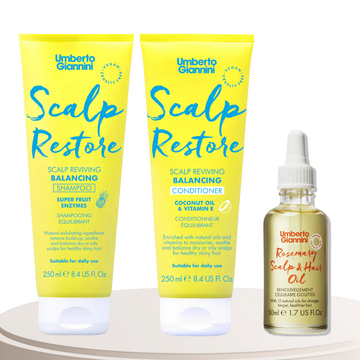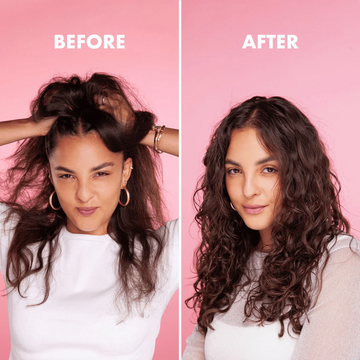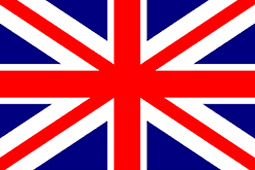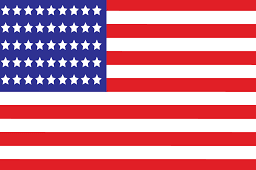Why is a healthy scalp key to healthy hair growth?
Every hair grows from a follicle, which is a tube-shaped structure that starts in the dermis layer of your skin and extends up through the epidermis layer, and every hair follicle on the scalp has a sebaceous gland which produces sebum, or oil.
If the follicle opening is blocked by dead skin, bacteria, product build-up or sebum, this can have a significant impact on the quality and thickness of hair growth. Infections and inflammation of the scalp can also have an effect, and can actually cause the hair follicle to eventually scar over, causing no hair to be produced at all.
How common are scalp issues?
Common problems include seborrhoeic dermatitis, which is an inflammatory skin condition that affects the sebaceous or greasy areas of skin, causing red, itchy, sore skin with flaking and scaling. Dandruff is a common and mild form of seborrhoeic dermatitis, and both of these conditions on the scalp are caused by a reaction to a yeast called Malasezzia.
Around 4% of the population has seborrhoeic dermatitis, and around half of adults have dandruff. Seborrheoic dermatitis can affect the whole scalp, but while it often affects the hairline and behind the ears, it can also cause rashes around the nose and cheeks, on the chest, and in between the shoulder blades.
Psoriasis is another common scalp issue that can cause a itchy flaky scalp, and affects around 1 in 50 people, psoriasis is an autoimmune disease and it can affect the nails and joints as well as the skin. Seborrhoeic dermatitis and psoriasis can look similar, but the key difference is that the scaling caused by psoriasis are usually thicker, more adherent to the scalp and silver in colour, while seborrhoeic dermatitis scales are more greasy, loosely attached to the scalp and yellow or white.
Seborrhoeic dermatitis, psoriasis and hair loss should be diagnosed by a specialist, so if you are worried, speak to your GP, a dermatologist or a trichologist for help.
The Hair Cycle
Hair growth is made up of three main cycles - anagen, catagen and telogen.
The anagen phase is the growth phase. Hair grows around half an inch a month and lasts on average around 3-5 years. When you’re pregnant, your body has higher levels of oestrogen – the hair fairy hormone – so when levels drop after you’ve given birth, hair shedding can occur. The catagen phase is the second and shortest part of the cycle usually lasting around 10 days, then lastly, the telogen phase - the resting phase – is when hair is released and falls out. Many factors including diet, trauma, illness, age and hormonal changes can interrupt this growth cycle, weakening its efficiency, causing shedding, thinning and hair loss.
What’s the difference between a dry scalp, dandruff and build-up?
A dry scalp can cause similar flakes to dandruff, but where dandruff is an oily skin condition, a dry scalp is caused by not enough moisture on the skin, so your scalp might feel tight and uncomfortable.
Dry scalps can be caused by over-washing, using harsh ingredients in your shampoo, hormonal changes and medications. Alternatively, not washing the hair enough can cause build-up of product, sebum and dirt on the scalp which can lead to irritation and inflammation.
What is the link between hair loss and scalp health?
All of these scalp issues can impact hair growth, and different hair loss conditions can also cause issues with the scalp too. For example, telogen effluvium, which is increased hair shedding related to stress on the body (this can be emotional or physical stressors such as nutritional deficiency, illness and childbirth), can cause people to experience tenderness, unusual sensations, and pain on their scalp, which is called trichodynia.
We also know that oxidative stress can have an impact on hair growth. Oxidative stress is caused by an imbalance between unstable, cell-damaging atoms called free radicals and the antioxidants which can neutralise them.
Sources of oxidative stress that can affect hair growth are smoking, pollution, irritants and UV radiation. Avoiding these sources of oxidative stress, as well as washing your hair and scalp regularly are really important in ensuring healthy hair growth and general scalp care.
How do you help dandruff, flaking and build-up on the scalp?
The good news is that with the right products and treatment, you can make sure your scalp is as clean and healthy as possible, ensuring that you give your hair the best environment to grow from.
Exfoliating your scalp every week is an important step in supporting scalp health.* Use the Scalp Restore Scalp Scrub weekly as a pre-shampoo treatment to deep clean and fight the cause of dandruff. The combination of clinically proven ingredients and natural exfoliants from super fruit enzymes and micro grains of natural walnut shell creates a super effective and non-irritating scrub that is nourishing to the hair too.
Scalp Scrub Exfoliating Anti-Dandruff Treatment - £9.75
If you struggle with a dry, itchy, flaky scalp, the Scalp Rescue Anti-Dandruff Mask should be added into your routine. Enriched with salicylic acid, the Mask gently restores balance by removing and preventing dandruff, while also taking that unhappy skin for a good scalp soothing.
Scalp Rescue Anti Dandruff Scalp Mask - £9.75
Using the right shampoo and conditioner with the best ingredients is key, the Scalp Restore Shampoo & Conditioner contains piroctone olamine which has been clinically proven to fight dandruff. The pineapple enzymes are a natural antioxidant, helping to combat oxidative stress on the scalp.
The shampoo and conditioner are gentle on the hair and skin, and are silicone, paraben and cruelty free.
Scalp Restore Shampoo & Conditioner Duo - £17.50
Because dandruff is an oily skin condition, dry shampoo is often a must. Choose a non-irritating and soothing formula like the Scalp Refresh Anti-Dandruff Dry Shampoo if you suffer from an itchy, flaky scalp and this will in turn support any oily scalp treatments.
Scalp Refresh Anti-Dandruff Dry Shampoo - £8.25
Trichologist’s top tips for maintaining a healthy scalp
As a trichologist, my top tips for maintaining a healthy scalp are:
- Exfoliate your scalp weekly or fortnightly to deep clean and refresh your scalp
- Choose the right products with clinically proven ingredients to fight the root cause of your scalp issues
- Make sure you wash your hair regularly to remove build-up of products and dirt
- Speak to your GP, a dermatologist, or a trichologist if you have a scalp problem to identify your issues and get the right treatment and product advice
- Even if it’s not your main problem, prioritising scalp health is still advisable to grow healthy hair
*If you have a scalp condition such as psoriasis or seborrhoeic dermatitis, check with your healthcare professional first before using exfoliating products.







 UK
UK US
US